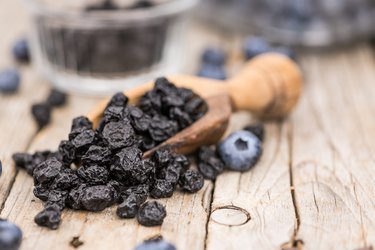
Dried blueberries pack a nutritional punch. They are low in sodium and in calories, offering 127 calories per one-quarter cup, and they contain no cholesterol. In addition, these fruits contain nutrients that are vital for your health. There are many ways for you to enjoy these sweet treats. You can make a smoothie by blending dried blueberries and a banana with your choice of milk or add blueberries to hot oatmeal.
Strong and Healthy Bones
Video of the Day
Dried blueberries are rich in vitamin K, providing about 23.8 micrograms of the vitamin per one-quarter cup. This amount equates to 20 to 26 percent of the recommended daily value for vitamin K. Vitamin K helps your blood clot properly and plays a crucial role in your bone health. Furthermore, vitamin K helps your body use calcium to build bones. Evidence suggests that vitamin K helps cut the risk of bone fractures, especially in postmenopausal women who are at risk for osteoporosis, according to the University of Maryland Medical Center.
Video of the Day
Combating Free Radicals
One-quarter cup of dried blueberries contains about 9.5 milligrams of vitamin C, meeting 11 to 13 percent of your daily needs. A water-soluble vitamin, vitamin C aids in bone growth and tissue repair. Your body needs vitamin C for healing wounds, as well as for repairing and maintaining your teeth and bones. Vitamin C also helps build collagen, which is a protein used to form ligaments, skin, blood vessels, tendons and cartilage. Collagen limits the damaging effects of free radicals through its antioxidant activity. Free radicals are unstable compounds that damage your DNA and may contribute to heart disease and cancer.
Approved for People With Type 2 Diabetes
Dried blueberries are a good source of fiber. One-quarter cup of dried blueberries provides you with 3 grams of fiber, fulfilling 10 to 12 percent of your daily fiber needs, according to USDA National Nutrient Database Fiber not only helps keep your digestive system healthy, but it helps controls blood sugar levels in Type 2 Diabetes.
Blueberries are an ideal food for people with diabetes because they are a low-carb fruit with a low glycemic index, meaning that they aren't likely to cause blood sugar spikes because they digest slower than many other carbohydrates. Diabetes Self-Management says that people with Type 2 Diabetes improved their average blood glucose levels by eating three servings of blueberries. Therefore Driscolls recommends blueberries for people with diabetes to enjoy as a snack.
Improving Cardiovascular Health
The Journal of the Science of Food and Agriculture published a study to investigate the role flavonoids, especially those in berries, in cardiovascular health. Recommendations from findings of the study suggested that berries be incorporated into the diet for cardiovascular benefits.
Blueberries have anti-oxidant properties that may help reduce the risk of heart attacks. The USDA Agricultural Research Service reported that eating blueberries may reduce the risk of heart attack in women by 33 percent. Anti-oxidants may help to control free radical damage that is involved in the early stages of artery-clogging atherosclerosis.
Dried blueberries are a rich source of anthocyanins, which are potent phytochemicals that give berries their blue color. Apart from this, anthocyanins help fight free radicals. Epidemiological and clinical studies have demonstrated an association between anthocyanins and improved cardiovascular health as indicated from a study published in 2017 by Superfood and Functional Food. The study investigated the potential health benefits from the antioxidant capacity of anthocyanin compounds in berries in an attempt to discover alternate treatments for chronic diseases.
Are Fresh Blueberries Better Than Dried?
A study published in Research Gate tested for potential changes in the anthocyanin and anti-oxidant effect after freezing or drying blueberries. Findings showed no notable decrease in anthocyanin or change in antioxidant capacity after three months of storage. The conclusion was that there is no difference in blueberries in fresh, frozen or dried form.
- USDA National Nutrient Database for Standard Reference: Blueberries, Dried, Sweetened
- Journal of Biomedicine and Biotechnology: The Change of Total Anthocyanins in Blueberries and Their Antioxidant Effect After Drying and Freezing
- Wiley Online Library: Journal of the Science of Food And Agriculture: Effect of Grape and Other Berries on Cardiovascular Health
- Research Gate: Anthocyanins in Berries and Their Potential Use in Human Health
- Research Gate The Change of Total Anthocyanins in Blueberries and Their Antioxidant Effect After Drying and Freezing
- USDA Agricultural Research Service: Grand Forks Human Nutrition Research Center: Grand Forks, ND: Blueberries and Health
- Diabetes Self-Management: A Berry Good Month: Berries and Diabetes
- Driscolls: Berry Diet for Diabetics
- USDA National Agricultural Library: Vitamin and Minerals